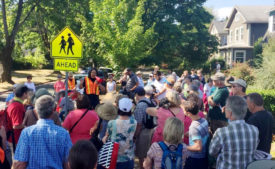I’ve written about the American political horse race before. We all know what’s wrong with it. First, the obvious: It’s only January and we’re already dead sick of hearing an endless (and fairly mindless) tally of strategic moves, campaign tactics, fundraising, and poll numbers. More importantly and fundamentally damaging though is that horse-race tunnel-vision keeps us from what could be a healthy national conversation about the future of the country and the issues that matter most. And a protracted one at that!
Take climate change, for example. Many of the presidential candidates are talking about it (some of them a lot). But the media are not.
In a recent study, the League of Conservation Voters found that in the more than 120 interviews and debates with the presidential candidates in 2007, the five major political talk show hosts collectively have asked 2,484 questions. In all this time, the words “global warming” or “climate change” have only been mentioned three times and only a handful of climate-related questions have been asked. Twenty-four, to be precise.
Here’s the breakdown:
- NBC’s Tim Russert: 664 questions, 0 mentioned global warming; 12 climate-related questions
- CNN’s Wolf Blitzer: 311 questions, 1 mentioned global warming; 3 climate-related questions
- ABC’s George Stephanopoulos: 661 questions, 0 mentioned global warming; 5 climate-related questions
- CBS’s Bob Scheiffer: 212 questions, 0 mentioned global warming; 0 climate-related questions
- Fox’s Chris Wallace: 427 questions, 2 mentioned global warming; 4 climate-related questions
Sunday talk shows aside, an analysis by Pew and Harvard University of the first five months of presidential election coverage in 2007 finds that 63 percent of the campaign stories focused on tactical issues compared to 17 percent that focused on the personal backgrounds of the candidates, 15 percent that focused on the candidates’ ideas and policy proposals and just 1 percent of stories that examined the candidates’ records or past public performance.
Just 12 percent of stories examined were presented in a way that explained how citizens might be affected by the election – by telling potential voters how a candidate might lead if elected, for example – while nearly nine-out-of-ten stories (86 percent) focused on “insider baseball” – matters that largely impacted only the parties and the candidates’ chances.
(An aside: Much of the coverage of horse race polling borders on pure conjecture anyway, making it all that much more empty punditry. Illustrating this point, Pollster.com has a great – and wonky – overview of the flaws inherent in trying to predict the outcomes in tonight’s Iowa caucuses. An excerpt: “Yes, despite tens of thousand of interviews, polls of every shape, size and method and our own fancy charts featuring regression-derived trend lines of varying degrees of sensitivity, the only thing we can say with confidence is that the Democratic and Republican races are close.”)
Back to campaign coverage. Climate doesn’t show up in Pew’s analysis of the topics that were reported:
Compare this to what Pew reports Americans are saying they’d like to hear about when they switch on the TV or pick up a newspaper:
A recent Gallup poll found that forty percent of Americans say a candidate’s position on global warming would be an important factor in their choice for president in 2008. The question is: Why aren’t the mainstream media helping Americans make an informed choice?











SLC
In the Dem debate last night (1/5), Charles Gibson did ask about climate change saying “Al Gore favors a carbon tax. None of you have favored a carbon tax. Is it a bad idea? Or is it just so politically unpalatable that you guys [sic] don’t want to propose it?”It seemed like Richardson and Obama answered the question while Edwards and Clinton just talked about energy costs being too high. I didn’t watch the Rep. debate, but in searching the transcript McCain seems like the only one talking about greenhouse gas emissions. (I searched for climate, global warming, and carbon- none of which showed up.)Anyway, I’d love to see an analysis of all their answers across the debates and interviews. For me, the most obvious trend is the Reps. are hardly talking about global warming/emissions at all, probably because the environment isn’t “their” issue. But that’s the problem, right? The candidates are somehow shaping the questions they get: “I don’t talk about environmental issues and so you can’t ask me about them.” Seems pretty obvious who’s setting the agenda. Even in a “debate!”
Morgan Ahouse
Richardson, who answered this question first, said he favored an emissions cap because a tax will be passed on to consumers. Obama, who went second, corrected him on this point. Though Richardson did say we need an 80% GHG reduction by 2040. Clinton made the connection between the green economy and the current economic slow down. The moderator then changed the topic to tax policy. transcript p 21
Matt the Engineer
[SLC] I watched the Rep debates (it was painful, but I managed to sit through it), and when McCain claimed that global warming might be real, kind of, or at least may be some vague time in the future, everyone else was silent and looked at him like he was insane. I found it a little bit encouraging that they all seemed concerned about energy independence. Yes, focusing on energy independence can get us in big trouble if the goal is increasing coal, ethanol, or domestic oil drilling, but they talked about “man on the moon” level of effort toward things like solar, wind, and nuclear (ok, and ethanol or drilling). Less than four years ago there was outrage about a (moveon.org?) commercial saying that when you pump fuel you support the terrorists – now it was openly discussed in the republican debates.